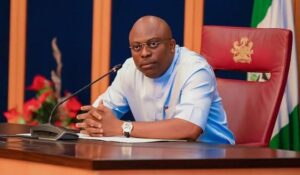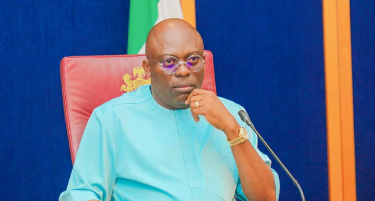Rivers State Governor, Siminalayi Fubara, has made a significant administrative move by suspending Otonye Briggs, the Chairman of the Caretaker Committee for Akuku-Toru Local Government Area. The suspension, which takes effect immediately, was communicated to the public through a statement issued on Tuesday by Nelson Chukwudi, the Chief Press Secretary to the Governor. Interestingly, the statement did not provide specific details or reasons behind the suspension of Briggs, leaving room for speculation and raising questions about the underlying factors that prompted this decision.
In the statement, Chukwudi conveyed that Honorable Bitebobo Amiee has been appointed to take over as the new chairperson of the Caretaker Committee. This change in leadership is expected to be implemented immediately, with Mr. Briggs being instructed to hand over all council property in his possession to the incoming chairperson. “The Governor has directed Hon Bitebobo Amiee to immediately take over as chairperson. Mr. Briggs is hereby directed to hand over all council property in his possession to the (new) Caretaker Committee Chairperson,” Chukwudi announced. However, the lack of detailed reasons for Briggs’ suspension has left many curious about what might have led to this abrupt change.
 This sudden development comes just three months after Governor Fubara inaugurated the chairpersons of the caretaker committees for all 23 local government areas in Rivers State. This caretaker committee system was established following the end of the three-year tenure of the previously elected council officials. The suspension of Briggs is, therefore, seen as a significant and unexpected move within the state’s political landscape, especially given that it is happening so soon after the inauguration of these committees.
This sudden development comes just three months after Governor Fubara inaugurated the chairpersons of the caretaker committees for all 23 local government areas in Rivers State. This caretaker committee system was established following the end of the three-year tenure of the previously elected council officials. The suspension of Briggs is, therefore, seen as a significant and unexpected move within the state’s political landscape, especially given that it is happening so soon after the inauguration of these committees.
The backdrop to this development is a complex political scenario in Rivers State. The transition from the former elected council officials to the newly appointed caretaker committees was not without controversy. In fact, it resulted in a serious clash between the supporters of Governor Fubara and those of his predecessor, Nyesom Wike, who now serves as the Minister of the Federal Capital Territory (FCT). When the previous local government chairpersons, who had the backing of Wike, resisted vacating office after their tenure expired, it led to a standoff with the new administration. This conflict eventually escalated into violence, resulting in the tragic deaths of two individuals, including a police officer.
In response to the outbreak of violence, the Nigerian Police Force took decisive action by ordering its officers to take control of the 23 local government council secretariats across the state. This move was aimed at restoring order and preventing further clashes between the rival factions. The situation created a tense atmosphere in Rivers State’s political scene, underscoring the deep-rooted power struggles and the high stakes involved in local governance.
Otonye Briggs, in the short time he held office as the chairman of the caretaker committee, had not been operating from his official office. This was largely because the council secretariat remained under the occupation of the police, following the directive to maintain security and prevent any potential escalation of conflict. The inability to use the official office is a reflection of the ongoing instability and tension within the local government framework in Rivers State.
Governor Fubara’s decision to suspend Briggs adds yet another layer to the already intricate and charged political environment in the state. It also raises questions about the nature of the relationship between the current administration and the local government authorities. The rapid change in leadership at the Akuku-Toru Local Government Area signals possible underlying issues that might extend beyond what has been publicly disclosed. Whether this suspension is a result of internal administrative challenges, political maneuvering, or other undisclosed factors, remains to be seen.
This situation exemplifies the broader challenges faced in the management and administration of local government areas in Nigeria. The appointment of caretaker committees is often seen as a temporary measure to maintain governance and continuity after the tenure of elected officials. However, it can also lead to power tussles and conflicts, especially when there is a change in state leadership or when there are lingering influences from previous administrations, as seen in the case of Rivers State.
In the midst of this unfolding political drama, the people of Akuku-Toru Local Government Area, like many others across the state, are left to watch and wait for how these changes will impact their daily lives and the governance of their communities. The appointment of Honorable Bitebobo Amiee as the new caretaker chairperson comes with expectations of stability and effective leadership, amidst the backdrop of a politically charged environment.
As this story continues to develop, the suspension of Otonye Briggs serves as a reminder of the fluid and often unpredictable nature of political dynamics at the local government level in Nigeria. It also highlights the challenges faced by new administrations in navigating the legacy and influence of their predecessors. The coming days and weeks may offer more clarity on the reasons behind this decision and its implications for governance in Rivers State. For now, the focus will be on how this change in leadership will be managed and what it means for the future of local governance in the area.




